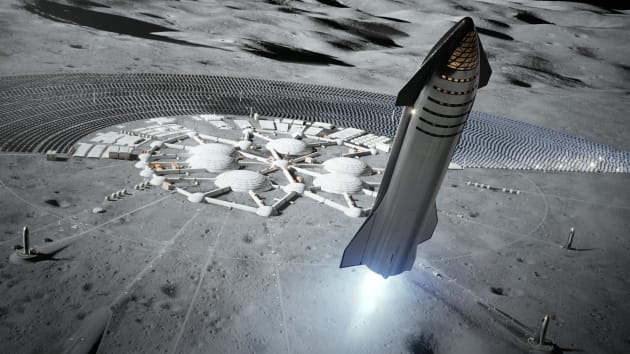The bad blood between Blue Origin and Elon Musk’s SpaceX continues, after the former announced it is suing the US space agency NASA.
According to CNBC, Blue Origin on Monday filed a sealed complaint in federal court against NASA, as part of its ongoing allegation that the US space agency wrongly awarded a lucrative contract solely to SpaceX earlier this year.
In April, the US space agency had awarded Elon Musk’s venture a $2.9 billion contract to build the Artemis lunar lander to carry humans to the moon, as early as 2024.
Elon Musk tweeted at the time that Blue Origin ‘couldn’t get it up.’

Lunar contract
The American space agency had intended to have at least two private-sector companies compete to build the spacecraft that will ferry astronauts and equipment to the lunar surface for the space agency’s Artemis moon landing missions.
NASA’s announcement in early April that it would move forward with SpaceX as the sole contractor for the project surprised some, but the space agency cited costs as a primary reason for the decision, namely its own funding shortfalls, and SpaceX’s proven record of orbital missions.
The space agency had received only $850m of the $3.3bn it had requested from the US Congress to build the Moon lander.
NASA’s decision to award the contract to SpaceX also triggered a formal protest from Jeff Bezos and Blue Origin, filed with the Government Accountability Office (GAO).
Jeff Bezos in July offered to personally cover up to $2bn in NASA costs if the agency also offered it a lunar lander contract.
Blue Origin essentially offered to waive payments of up to $2bn and pay for an orbital mission to test its technology, as well as covering any system development cost overruns.
But on 2 August 2020, the Government Accountability Office (GAO) rejected Blue Origin’s challenge of NASA’s $2.9 billion (£2bn) lunar lander contract deal with Space X.
The GAO also rejected a similar protest from military contractor Dynetics.
Elon Musk then rubbed salt into the wounds, and last week tweeted a mocking photo of a deflated Blue Origin moon lander prototype and captioned, “Somehow, this wasn’t convincing…”
Blue Origin lawsuit
Now after Blue Origin failed to convince NASA with its cash discount, and faced with its appeal being rejected by the GAO watchdog, Jeff Bezos has opted to pursue legal channels.
According to CNBC, Blue Origin filed its objection in the US Court of Federal Claims on Monday.
“This bid protest challenges NASA’s unlawful and improper evaluation of proposals,” Blue Origin’s lawyers wrote in its court filing.
A Blue Origin spokesperson confirmed the lawsuit filing, adding in a statement to CNBC that it is looking “to remedy the flaws in the acquisition process found in NASA’s Human Landing System.”
“We firmly believe that the issues identified in this procurement and its outcomes must be addressed to restore fairness, create competition, and ensure a safe return to the Moon for America,” Blue Origin said.
In a statement to CNBC, a NASA spokesperson said the space agency’s “officials are currently reviewing details of the case.”
Elon Musk
Blue Origin has sought to convince the public of the merits of its case versus SpaceX, when it released a series of infographics that emphasised the “unprecedented number of technologies, developments, and operations that have never been done before for Starship to land on the Moon.”
Elon Musk took the opportunity to respond in a savage manner on Twitter to Blue Origin’s claims.
“The sad thing is that even if Santa Claus suddenly made their hardware real for free, the first thing you’d want to do is cancel it,” Musk tweeted.
However, the legal action could potentially put the whole Artemis moon landing missions at risk of cancellation or delay.
After all, when the Pentagon in July opted to scrap its JEDI cloud project, that it had awarded to Microsoft in 2019, after Jeff Bezos and Amazon Web Services filed a series of legal challenges to Redmond being awarded the contract.





